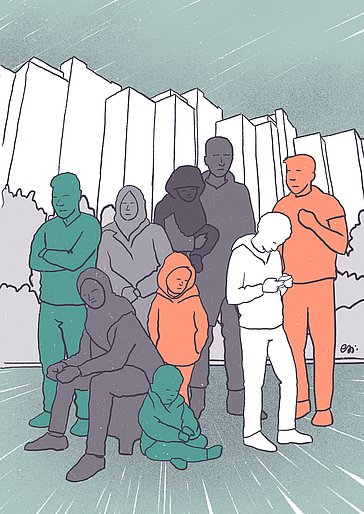
AFGHANISTAN
Kafkaesque German bureaucracy
Wasif Nazemi: Iran - Greece - Germany - Afghanistan
When Wasif Nazemi* arrived in Kabul in 2018, he was alone. He could not find anyone to talk to or support him, neither through the return counselling service nor through private contacts. Plunged into a deep depression in Germany, he was no longer able to think clearly and assess the consequences of his decision.
But in Kabul he suddenly realised that it had been a big mistake to give up and return to a place he had never been before. Like so many Afghans, Wasif grew up as a refugee in Iran. As a “returnee”, he set foot on Afghan soil in 2018 for the first time in his life. Nothing here was familiar, there was nothing to give him stability or autonomy. And it was not safe, either. His German girlfriend Julia remembers how desperate and confused he had been when she spoke to him on the phone a few weeks after his arrival in Kabul. He had said, “I have to leave this country again, there is nothing for me here.”
Back, but completely demoralised
Wasif fled from Iran to Greece. He reached Germany in autumn 2015, where he was lucky: the processing of his application for asylum took a long time, and during this phase he was not allowed to work or officially attend a German language course, nor was he allowed to move into his own flat. But he met some committed people from a welcome initiative, who helped make it possible for him to attend a German course on an informal basis. It was there that he also met Julia, and the two became friends. Julia confirms that Wasif did not receive a secure stay, that he had to wait months for a work permit, was excluded from language courses and was therefore permanently dependent on voluntary support. Due to these restrictions and the feeling of not moving forward, he fell into a deep depression. Finally, he decided to depart through a voluntary return programme. Julia stresses: “Voluntarily? I want that to be put in inverted commas.”
Since Wasif has been back in Kabul, he often talks to Julia on the phone. Together they have considered her officially inviting him to Germany. Unlike after a deportation, this is possible with a “voluntary” return. But while Julia was getting everything together for a declaration of commitment and other documents, she was told by German authorities that Wasif Nazemi is registered at “address unknown” and that an invitation is therefore impossible. “They doubted that Wasif had arrived in Kabul in the first place,” Julia explains.
Lost in bureaucratic red tape
This is what happened: Wasif had officially registered for voluntary departure with the immigration authorities in Germany. While still at the airport, he was provided with pocket money. But his whereabouts after his return were not documented. Enquiries with German authorities and institutions in Kabul finally revealed that every individual had to submit a so-called border-crossing certificate (GÜB) upon arrival in Kabul. Wasif and the others who left with him were not informed about this. “Ifyou don’t hand in this form, you are considered to have moved to an unknown address. So for the German authorities, Wasif had not departed from Germany for Kabul, he simply did not exist. And one cannot invite someone who does not officially exist,” is how Julia describes the administrative logic.
There are indeed official documents evidencing Wasif’s return: Two days after his arrival in Kabul, he had a passport issued by the competent Afghan authority. But even this document was not recognised by the German authorities as proof that he is in Kabul. Instead, they demanded that he go to a German embassy to clear up his identity and demonstrate his arrival in Kabul. The visa section for Afghans at the embassy in Kabul was closed, however. Wasif was told to go to the embassies in Iran, Turkey or Pakistan. He actually made an appointment at the German embassy in Istanbul. But Turkey refuses to allow him to enter the country.
Julia and Wasif have given up on their plan to make an official invitation to come to Germany. Wasif now lives in Herat without any social connections and without a job. And since he never officially arrived in Afghanistan in the eyes of the German authorities, his entitlement to longer-term financial and psychosocial support promised in the return programmes no longer applies.
* The names have been changed by the editors.
